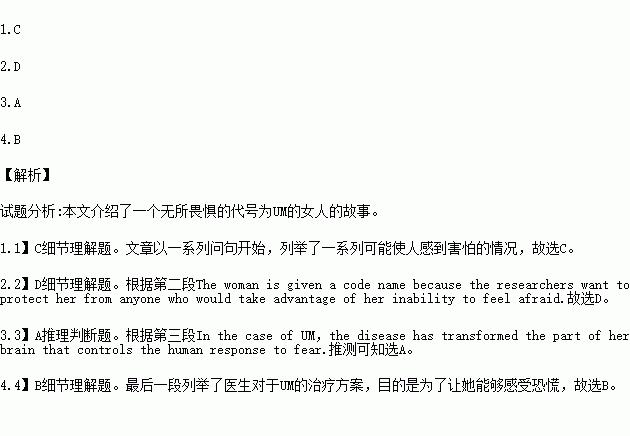题目内容
Think about the last time you felt afraid. Was it a fear of height? Did you oversleep on a weekday and fear you’d get into trouble at the office? In any case, you know what it feels like to feel fear.
But one woman doesn’t The woman, code-named “UM”, gave her first-ever interview after years of being studied by a team of researchers. The woman is given a code name because the researchers want to protect her from anyone who would take advantage of her inability to feel afraid.
UM can’t tell you what fear is because she’s never experienced it. “I wonder what it’s like to actually be afraid of something,” she said. The formal name for the disease is Urbach-Wieth disease, which is characterized by a hoarse(粗哑的)voice,small bumps around the eyes, and calcium deposits(钙沉积的)in the brain.
In the case of UM,the disease has transformed the part of her brain that controls the human response to fear. In the interview, UM talks about an event in her life where she was held at knifepoint and gunpoint, “I was walking to the store,and I saw a man on a park bench.He said. “Come here,please,” so I went over to him. He grabbed me by the shirt,put a knife to my throat and told me he was going to cut me. I told him, “Go ahead and cut me,” I wasn’t afraid at all. And for some reason,he let me go.”
Doctors who have been studying UM’s condition for years have been trying different things that could strike fear into her. They finally figured something out—increasing UM’s carbon dioxide levels.Extra carbon dioxide concentration in the blood is known to cause fear and panic in health individuals. Increasing UM’s carbon dioxide levels did manage to give her a fright.
1.The text starts by_______.
A. challenging the reader
B. solving daily problems
C. listing situations
D. giving explanations
2.Why is the woman with Urbach-Wieth disease given a code name?
A. To tell her case from other patients
B. To respect her privacy
C. To meet the researchers’ demands
D. To ensure her safety
3.From UM’s case,we can know that Urbach-Wieth disease may________.
A. stop the brain from functioning normally
B. lead to a decrease in calcium deposits
C. stop the brain from responding quickly
D. lead to an increase in carbon dioxide
4.What will probably happen to UM from the last paragraph?
A. Dying of the Urbach-Wieth disease.
B. Getting the sense of panic.
C. Experiencing another danger.
D. Speaking with a hoarse voice.
 名校课堂系列答案
名校课堂系列答案根据句意,选择方框中的单词,将其正确形式填入句中空格,并将答案写在相应位置。
devote; purpose; generous; graduate; outdoors; recognize; doubt; actually |
1.After ________ from college, we finally got the chance to take a bike trip down the Mekong River.
2.Lisa! I’m sorry I didn’t ________ you. You’ve changed so much!
3.He looked calm, but ________ he was very nervous.
4.Little kids sometimes will make noises on ________ to catch adults’ attention.
5.It is ________ of you to lend your car to him every weekend.
6.There is no ________ that advertising helps improve sales.
7.Playing ________ is good for children’s health.
8.She is so ________ to her work that she always works late into the night.


 to look after him
to look after him